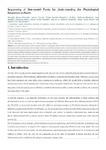Please use this identifier to cite or link to this item:
http://lib.hpu.edu.vn/handle/123456789/22736| Title: | Plant Genomics. Chapter 5: Sequencing of Non-model Plants for Understanding the Physiological Responses in Plants |
| Authors: | Alonso-Herrada, Jannette Urrutia, Ismael Escobar-Feregrino, Tania |
| Keywords: | Agriculture Science Biological Science Genome size NGS Polyploidy Transcriptome Wild materials |
| Issue Date: | 2016 |
| Publisher: | INTECH Open Access Publisher |
| Abstract: | From a genomic point of view, plants are complex organisms. Plants adapt to the environment, by developing different physiological and genetic properties, changing their genomic and expression profiles of adaptive factors, as exemplified by polyploidy studies. These characteristics along with the presence of duplicated genes/genomes make sequencing with early low-throughput DNA sequencing technologies in plants a challenging task. With the development of new technologies for molecular analysis, including transcriptome, proteome or microarray profiling, a new perspective in the genomic analysis was open, making possible to programs in species without genomic maps. The opportunity to extend molecular studies from laboratory model scale toward naturally occurring plant populations made it possible to precisely answer the longstanding important ecological and evolutionary questions. Some plant species have unique properties that could help to understand their adaptability to environment, crop production, pest protection or other biological processes. Molecular studies on non-model plants, including algae, mosses, ferns and plants with very specific characteristics are ongoing. |
| URI: | https://lib.hpu.edu.vn/handle/123456789/22736 |
| ISBN: | 978-953-51-2456-6 |
| Appears in Collections: | Education |
Files in This Item:
| File | Description | Size | Format | |
|---|---|---|---|---|
| 40_PlantGenomics_CH5.pdf Restricted Access | 355.28 kB | Adobe PDF |  View/Open Request a copy |
Items in DSpace are protected by copyright, with all rights reserved, unless otherwise indicated.
